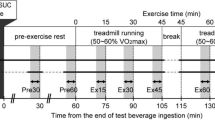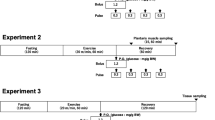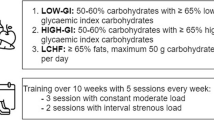Summary
Whether or not a high intake of carbohydrate increases postprandial energy expenditure during exercise was studied in rats. The rats were meal-fed regularly twice a day (0800–0900 hours and 1800–1900 hours) on either a high carbohydrate (CHO) (carbohydrate/fat/protein = 70/5/25, % of energy) or high fat (FAT) (35/40/25) diet for 12 days. On the final day of the experiment, all of the rats in each dietary group were fed an evening meal containing equal amounts of energy (420 kJ · kg−1 body mass). After the meal, they were divided into three subgroups: pre-exercise control (PC), exercise (EX), and resting control (RC). The PC-CHO and PC-FAT groups were sacrificed at 2030 hours. The EX-CHO and EX-FAT groups were given a period of 3-h swimming, and then sacrificed at 2330 hours. The RC-CHO and RC-FAT groups rested after the meal and were sacrificed at 2330 hours. Total energy expenditure during the period 1.5 h from the commencement of exercise was higher in EX-CHO than in EX-FAT. The respiratory exchange ratio was also higher in EX-CHO than in EX-FAT, suggesting enhanced carbohydrate oxidation in the former. Compared with both PC-FAT and RC-FAT, the liver glycogen content of EX-FAT rats was significantly decreased by exercise. On the other hand, the liver glycogen content of both EX-CHO and RC-CHO was higher than that of PC-CHO rats. The glycogen content of soleus muscle of EX-FAT was slightly decreased during exercise, however, that of EX-CHO increased significantly. Thus postprandial energy expenditure during exercise was higher in the rats fed the CHO diet than in those fed the FAT diet, which could have been related to the increase of both liver and muscle glycogen storage during exercise in the former.
Similar content being viewed by others
References
Abbott WGH, Howard BV, Ruotolo G, Ravussin E (1990) Energy expenditure in humans: effects of dietary fat and carbohydrate. Am J Physiol 258:E347-E351
Acheson KJ, Flatt JP, Jequier E (1982) Glycogen synthesis versus lipogenesis after a 500 gram carbohydrate meal in man. Metabolism 31:1234–1240
Acheson KJ, Schutz Y, Bessard T, Ravussin E, Jequier E, Flatt JP (1984) Nutritional influences on lipogenesis and thermogenesis after a carbohydrate meal. Am J Physiol 246: E62-E70
Astrup A, Simonsen L, Bulow J, Madsen J, Christensen NJ (1989) Epinephrine mediates facultative carbohydrate-induced thermogenesis in human skeletal muscle. Am J Physiol 257:E340-E345
Bahr R, Ingnes I, Vaage O, Sejersted OM, Newsholme EA (1987) Effect of duration of exercise on excess postexercise O2 consumption. J Appl Physiol 62:485–490
Baker MA, Horvath SM (1964) Influence of water temperature on oxygen uptake by swimming rats. J Appl Physiol 19:1215–1218
Bielinski R, Schutz Y, Jequier E (1985) Energy metabolism during the postexercise recovery in man. Am J Clin Nutr 42:69–82
Chakrabarty K, Leveille GA (1968) Influence of periodicity of eating on the activity of various enzymes in adipose tissue, liver, and muscle of rat. J Nutr 96:76–82
Dallosso HM, James WPT (1984) Whole-body calorimetry studies in adult men. Br J Nutr 52:65–72
Gleeson M, Waring JJ (1986) Influence of diet on the storage, mobilization and utilization of energy reserves in trained and untrained rats. Comp Biochem Physiol (A) 85:411–415
Gleeson M, Brown JF, Waring JJ, Stock MJ (1982) The effects of physical exercise on metabolic rate and dietary-induced thermogenesis. Br J Nutr 47:173–181
Gorostiaga EM, Czerwinski SM, Hickson RC (1988) Acute glucocorticoid effects on glycogen utilization, O2 uptake, and endurance. J Appl Physiol 64:1098–1106
Hawley JA, Dennis SC, Noakes TD (1992) Oxidation of carbohydrate ingested during prolonged endurance exercise. Sport Med 14:27–42
Hickson JF, Hartung GF Jr, Pate TD, Kendall SC, McMahon JC, Moore CM (1986) Effect of short-term energy intake level and exercise on oxygen consumption in men. Eur J Appl Physiol 55:198–201
LeBlanc J (1988) Exercise training and energy expenditure. In: Bray G, LeBlanc J, Inoue S, Suzuki M (eds) Diet and obesity. Japan Science Society Press, Tokyo and Karger, Basel, pp. 181–190
Lo S, Russel JC, Taylor AW (1970) Determination of glycogen in small tissue samples. J Appl Physiol 28:234–236
Maehlum S, Grandmontagne M, Newsholme EA, Sejersted OM (1986) Magnitude and duration of excess postexercise oxygen consumption in healthy young subjects. Metabolism 35:425–429
Masoro EJ (1962) Biochemical mechanisms related to the homeostatic regulation of lipogenesis in animals. J Lipid Res 3:149–164
Pacy PJ, Barton N, Webster JD, Garrow JS (1985) The energy cost of aerobic exercise in fed and fasted normal subjects. Am J Clin Nutr 42:764–768
Saitoh S, Simomura Y, Tasaki Y, Suzuki M (1992)Effect of short-term exercise training on muscle glycogen in restling conditions in rats fed a high fat diet. Eur J Appl Physiol 64:62–67
Schutz Y, Bessard T, Jequier E (1987) Exercise and postprandial thermogenesis in obese women before and after weight loss. Am Clin Nutr 45:1424–1432
Segal KR, Gutin B (1983) Thermic effects of food and exercise in lean and obese women. Metabolism 32:581–589
Segal KR, Presta E, Gutin B (1984) Thermic effect of food during graded exercise in normal weight and obese men. Am J Clin Nutr 40:995–1000
Segal KR, Gutin B, Nyman AM, Pi-Sunyer FX (1985) Thermic effect of food at rest, during exercise, and after exercise in lean and obese men of similar body weight. J Clin Invest 76:1107–1112
Segal KR, Chun A, Coronel P, Valdez V (1992) Effects of exercise mode and intensity on postprandial thermogenesis in lean and obese men. J Appl Physiol 72:1754–1763
Shimomura Y, Suzuki T, Saitoh S, Tasaki Y, Harris RA, Suzuki M (1990) Activation of branched-chain a-keto acid dehydrogenase complex by exercise: effect of high-fat diet intake. J Appl Physiol 68:161–165
Suzuki M, Ide K, Saitoh S (1984) Diurnal changes in glycogen stores in liver and skeletal muscle of rats in relation to the feed timing of sucrose. J Nutr Sci Vitaminol (Tokyo) 29:545–552
Vissing J, Wallace JL, Galbo H (1989) Effect of liver glycogen content on glucose production in running rats. J Appl Physiol 66:318–322
Author information
Authors and Affiliations
Rights and permissions
About this article
Cite this article
Saitoh, S., Matsuo, T. & Suzuki, M. The effects of a high carbohydrate diet on postprandial energy expenditure during exercise in rats. Europ. J. Appl. Physiol. 66, 445–450 (1993). https://doi.org/10.1007/BF00599619
Accepted:
Issue Date:
DOI: https://doi.org/10.1007/BF00599619




